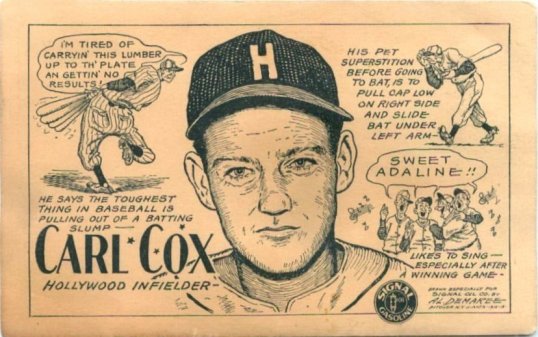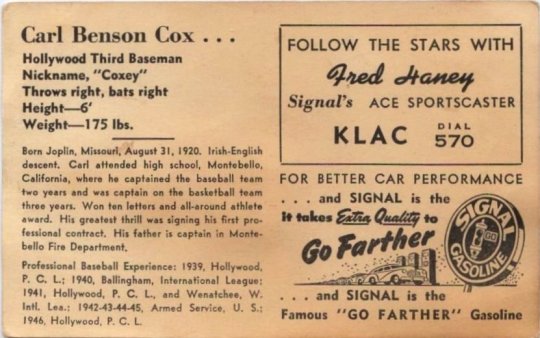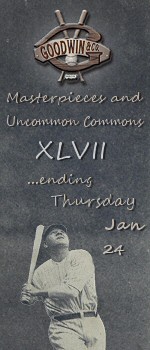2. Featured Set: 1947 U011 Signal Gasoline
This set of 89 cards features players from five of the eight teams then participating in the Pacific Coast League. The cards were part of a promotion by Signal Gasoline and distributed at the company's local gas stations in the home towns for each team.
The unnumbered cards are listed in the American Card Catalog as set UO11. It was the second and largest of three baseball sets sponsored by Signal starting in 1938.

1947 Signal Gasoline -- Front | |

Back | |
The 3-1/2 x 5-1/2-inch black and white cards feature detailed line drawings of the subject player along with illustrated career highlights in cartoon format. The player's name, team and position are also prominently displayed on the card front.
The backs contain a more detailed career narrative along with a reference to the radio station for each team's locale and an ad for Signal Gasoline.
The five teams represented in the 1947 Signal Gasoline set are the Hollywood Stars, the Los Angeles Angels, the Oakland Oaks, the Sacramento Solons and the Seattle Rainiers. Of these, the cars for the Stars, Angels and Oaks were apparently distributed in greater quantity and are the most common among today's collectors. Those for the Solons, and especially the Rainiers, are noticeably more difficult to find.
In addition to the players featured on the cards, at least two former baseball players, Fred Haney and Al Demaree, left their marks on the 1947 Signal Gasoline set.
Fred Haney was billed by the sponsor as "Signal's Ace Sportscaster" for all Hollywood Stars' games broadcast on local radio station KLAC. As a result, Haney was named on the back of every card in the Hollywood Stars subset. In addition, he was featured as the subject on the front of one of the cards. According to Haney's card, he had been voted most valuable player in the Pacific Coast League some fifteen years earlier. Haney had also served as manager of the American League's St. Louis Browns from 1939 through 1941.
Al Demaree, a pitcher for the New York Giants and other Major League teams from 1912 through 1919, produced all of the artwork for the 1947 Signal Gasoline cards. A syndicated sports cartoonist for many years after his Major League service ended, Demaree also created the artwork for other baseball card sets. These include the R304 Demaree Die-cuts issued by Dietz Gum Company in 1934, the 1935 R332 Schutter-Johnson Candy set, and the 1938 R323 Goudey "Heads Up" issue.

Restored Signal Service Station |

Period Roadmap |
 The Signal Gasoline Company was founded in 1922 by Sam Mosher. The California-based company first produced gasoline from natural gas. In 1928, the company changed its name to Signal Oil & Gas, entering into oil production the same year. For the next several decades, including 1947 and 1948 when it produced its only baseball card sets, the company marketed its gasoline service stations under the Signal Gasoline name.
The Signal Gasoline Company was founded in 1922 by Sam Mosher. The California-based company first produced gasoline from natural gas. In 1928, the company changed its name to Signal Oil & Gas, entering into oil production the same year. For the next several decades, including 1947 and 1948 when it produced its only baseball card sets, the company marketed its gasoline service stations under the Signal Gasoline name.
Signal merged with the Garrett Corporation, a Los Angeles-based aerospace company, and in 1968 adopted "The Signal Companies" as its corporate name.
The Signal companies merged with Allied Corporation in 1985. By the turn of the millennium, the then-merged Allied-Signal Corporation had completed another transformation--and became a component of Honeywell Corp.
Side Note: the Signal gas station pictured above was recently restored to its original look, complete with vintage pumps, by Rod Phillips, a Portland, Oregon developer. The station is located at 8302 N. Lombard Street in the St. Johns area of that city. The front of the vintage road map (above right) confirms Signal Gasoline's 1940's architectural style used for its network of service stations. The restored station has been designated as a historic landmark and is now the home of Signal Station Pizza restaurant. So next time you're in Portland, you may want to stop by and try a slice!
A Set Profile and Checklist for the 1947 Signal Gasoline cards are provided on the Old Cardboard website.


